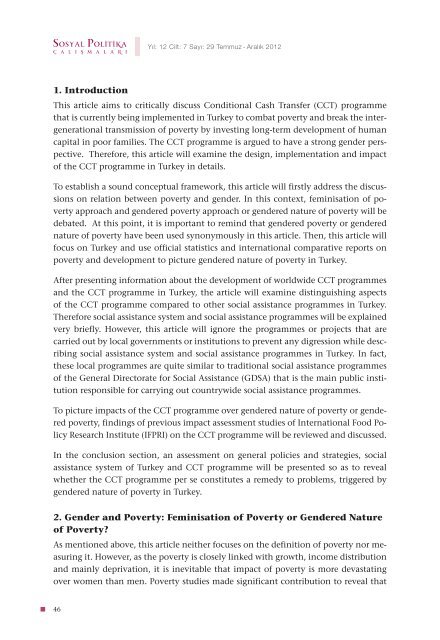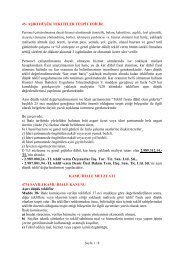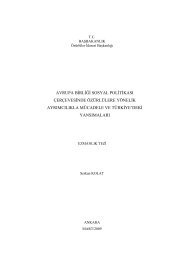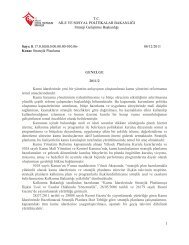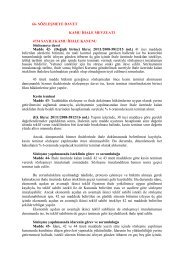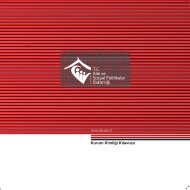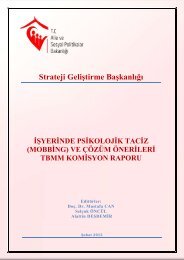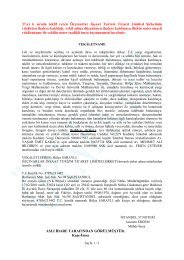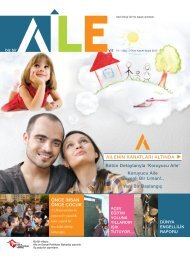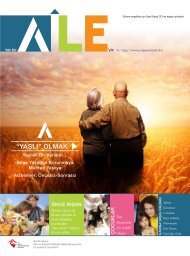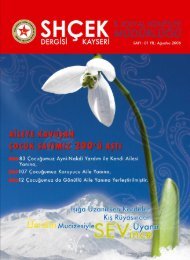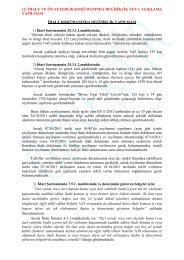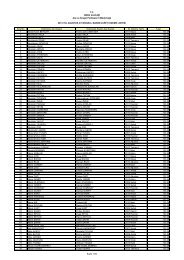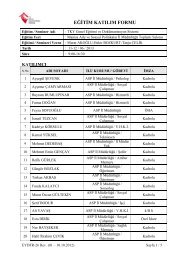Sosyal PolÄ°tÄ°ka tÄ°ka - EÄitim ve Yayın Dairesi BaÅkanlıÄı - Aile ve ...
Sosyal PolÄ°tÄ°ka tÄ°ka - EÄitim ve Yayın Dairesi BaÅkanlıÄı - Aile ve ...
Sosyal PolÄ°tÄ°ka tÄ°ka - EÄitim ve Yayın Dairesi BaÅkanlıÄı - Aile ve ...
- No tags were found...
You also want an ePaper? Increase the reach of your titles
YUMPU automatically turns print PDFs into web optimized ePapers that Google loves.
Yıl: 12 Cilt: 7 Sayı: 29 Temmuz - Aralık 2012<br />
1. Introduction<br />
This article aims to critically discuss Conditional Cash Transfer (CCT) programme<br />
that is currently being implemented in Turkey to combat po<strong>ve</strong>rty and break the intergenerational<br />
transmission of po<strong>ve</strong>rty by in<strong>ve</strong>sting long-term de<strong>ve</strong>lopment of human<br />
capital in poor families. The CCT programme is argued to ha<strong>ve</strong> a strong gender perspecti<strong>ve</strong>.<br />
Therefore, this article will examine the design, implementation and impact<br />
of the CCT programme in Turkey in details.<br />
To establish a sound conceptual framework, this article will firstly address the discussions<br />
on relation between po<strong>ve</strong>rty and gender. In this context, feminisation of po<strong>ve</strong>rty<br />
approach and gendered po<strong>ve</strong>rty approach or gendered nature of po<strong>ve</strong>rty will be<br />
debated. At this point, it is important to remind that gendered po<strong>ve</strong>rty or gendered<br />
nature of po<strong>ve</strong>rty ha<strong>ve</strong> been used synonymously in this article. Then, this article will<br />
focus on Turkey and use official statistics and international comparati<strong>ve</strong> reports on<br />
po<strong>ve</strong>rty and de<strong>ve</strong>lopment to picture gendered nature of po<strong>ve</strong>rty in Turkey.<br />
After presenting information about the de<strong>ve</strong>lopment of worldwide CCT programmes<br />
and the CCT programme in Turkey, the article will examine distinguishing aspects<br />
of the CCT programme compared to other social assistance programmes in Turkey.<br />
Therefore social assistance system and social assistance programmes will be explained<br />
<strong>ve</strong>ry briefly. Howe<strong>ve</strong>r, this article will ignore the programmes or projects that are<br />
carried out by local go<strong>ve</strong>rnments or institutions to pre<strong>ve</strong>nt any digression while describing<br />
social assistance system and social assistance programmes in Turkey. In fact,<br />
these local programmes are quite similar to traditional social assistance programmes<br />
of the General Directorate for Social Assistance (GDSA) that is the main public institution<br />
responsible for carrying out countrywide social assistance programmes.<br />
To picture impacts of the CCT programme o<strong>ve</strong>r gendered nature of po<strong>ve</strong>rty or gendered<br />
po<strong>ve</strong>rty, findings of previous impact assessment studies of International Food Policy<br />
Research Institute (IFPRI) on the CCT programme will be reviewed and discussed.<br />
In the conclusion section, an assessment on general policies and strategies, social<br />
assistance system of Turkey and CCT programme will be presented so as to re<strong>ve</strong>al<br />
whether the CCT programme per se constitutes a remedy to problems, triggered by<br />
gendered nature of po<strong>ve</strong>rty in Turkey.<br />
2. Gender and Po<strong>ve</strong>rty: Feminisation of Po<strong>ve</strong>rty or Gendered Nature<br />
of Po<strong>ve</strong>rty<br />
As mentioned abo<strong>ve</strong>, this article neither focuses on the definition of po<strong>ve</strong>rty nor measuring<br />
it. Howe<strong>ve</strong>r, as the po<strong>ve</strong>rty is closely linked with growth, income distribution<br />
and mainly deprivation, it is inevitable that impact of po<strong>ve</strong>rty is more devastating<br />
o<strong>ve</strong>r women than men. Po<strong>ve</strong>rty studies made significant contribution to re<strong>ve</strong>al that<br />
46


